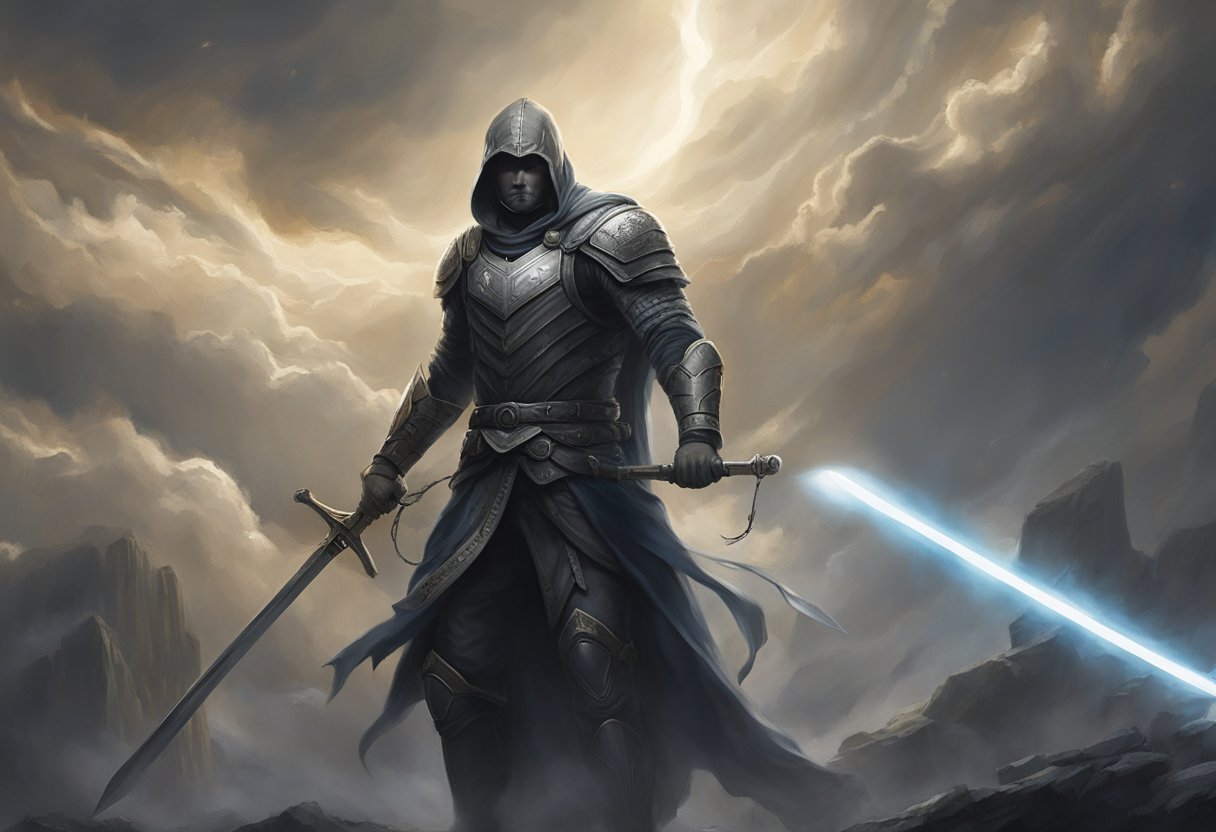Male Cancer Warrior Shares Inspiring Journey to Recovery
Facing cancer as a man can feel like stepping into the boxing ring without any training. I’ve been there twice. The diagnosis hits you like a sucker punch, leaving you winded and wondering if you’ll ever get back up. But here’s the truth: you can beat cancer and come out stronger on the other side.

My journey with lymphoma taught me that being a cancer warrior isn’t about never feeling afraid. It’s about facing that fear head-on and finding the courage to fight. Like a team rallying in the last quarter, we men need to tap into our inner strength and the support of those around us.
Recovery isn’t just about the body; it’s a mental game, too. Just as athletes visualize their success, we can picture ourselves overcoming cancer and living life to the fullest. It’s not always easy, but we can turn despair into determination with the right mindset and support.
Key Takeaways
- Men can overcome cancer despair by tapping into inner strength and support systems.
- Facing fear head-on builds courage and resilience during the cancer journey.
- Visualizing success and maintaining a positive mindset aids in recovery and rebuilding confidence.
Understanding Cancer and Its Challenges
Cancer changes lives in ways we never expected. It tests our strength and forces us to face our fears head-on. As someone who’s battled lymphoma twice, I know these challenges firsthand.
The Emotional Journey of Cancer
Cancer hits hard emotionally. Fear, anger, and sadness often overwhelm us. I remember feeling lost and alone after my diagnosis. But I learned to take it day by day.
Talking to others helped me cope. Support groups connected me with guys going through similar struggles. Counseling gave me tools to manage anxiety and depression.
Exercise became my outlet. Even on tough days, a short walk lifted my spirits. Team sports reminded me I wasn’t alone in this fight.
Keeping a journal helped me process my thoughts. Writing about good days motivated me during rough patches, and focusing on small wins kept me going when treatment got tough.
Types of Cancers in Males
Prostate cancer affects 1 in 8 men in their lifetime. It’s the most common cancer for guys, besides skin cancer. Regular screenings can catch it early.
Testicular cancer often strikes younger men. Monthly self-exams help detect it early. Treatment success rates are high when caught early.
Colorectal cancer risk increases with age. Colonoscopies save lives by finding polyps before they turn cancerous.
Lung cancer remains a top killer. Quitting smoking drastically cuts your risk. Low-dose CT scans can spot it early in high-risk men.
Skin cancers, like melanoma, are on the rise. Wear sunscreen and check your skin regularly. If you notice any changing moles, have them checked by a doctor.
Blood cancers like leukemia and lymphoma can occur at any age. Unexplained fatigue or bruising warrants a check-up.
Finding Hope Amidst the Struggle
Cancer can knock us down, but we have the power to rise again. As a two-time lymphoma survivor, I’ve learned that hope and a fighting spirit are our greatest weapons.
Cultivating a Positive Attitude
I faced dark days during my cancer journey. Fear and doubt crept in, but I focused on the light ahead. Each morning, I wrote down three things I was grateful for. This simple act shifted my mindset.
I visualized myself healthy and robust, picturing my body healing. When negative thoughts arose, I countered them with positive affirmations. “I am resilient. My body is powerful. I will overcome this.”
Exercise became my ally. A short walk or gentle stretches boosted my mood even on tough days. I set small, achievable goals and celebrated each victory, no matter how small.
Harnessing the Power of Encouragement and Faith
Surrounding myself with supportive people made a world of difference. I joined a cancer support group for men, where we shared our fears and triumphs. These connections reminded me I wasn’t alone in my fight.
My faith became a cornerstone of strength. Prayer and meditation calmed my anxious mind. I found comfort in spiritual texts and inspirational stories of other survivors.
I leaned on my loved ones, allowing them to uplift me. Their words of encouragement became my fuel. When I felt weak, their belief in me kept me going.
Hope is a powerful strategy in facing cancer. It gave me a glimpse of a brighter future and the courage to keep pushing forward.
The Essentials of Cancer Treatment

Cancer treatment involves several vital approaches to fight the disease and improve quality of life. The journey can be tough, but with the proper knowledge and support, it’s possible to face it head-on.
Conventional and Innovative Treatments
As a two-time lymphoma survivor, I’ve experienced both standard and cutting-edge treatments. Surgery, radiation, and chemotherapy form the backbone of cancer care. These tried-and-true methods have saved countless lives.
Newer options like immunotherapy and targeted therapies are game-changers. They work with your body’s defenses to attack cancer cells. I remember feeling like a linebacker, my immune system tackling those rogue cells.
MD Anderson Cancer Center and other top hospitals often combine these methods. This team approach can boost your chances of beating cancer.
Clinical trials offer hope for challenging cases. They test new drugs that might be tomorrow’s cures. I joined a trial during my second battle, and it felt like being part of the cancer-fighting dream team.
Understanding Chemotherapy and Its Effects
Chemo was my most formidable opponent. It’s a strong medicine that kills fast-growing cells, including cancer. But it can hit healthy cells, too, causing side effects.
Common issues include:
- Fatigue
- Nausea
- Hair loss
- Weakened immune system
I learned to manage these as a pro athlete recovering from injuries. Rest, good nutrition, and staying active when possible all helped.
Chemotherapy works in cycles, giving your body time to recover between rounds. It’s a marathon, not a sprint. Keeping a positive mindset was vital for me.
The goal is remission – when tests can’t find cancer anymore. It felt like winning the championship when I heard those words. However, follow-up care is crucial to stay in the game long-term.
Developing Strength and Courage as a Male Cancer Warrior

Cancer can knock us down, but we have the power to stand back up. As a two-time lymphoma survivor, I’ve learned that building mental toughness and physical strength are crucial to facing this challenge head-on.
Building Mental Resilience
Mental strength starts with accepting our new reality. Talking to other survivors helped me process my emotions and fears. Joining a support group for men with cancer gave me a safe space to share my struggles.
Mindfulness techniques like meditation and deep breathing became my daily rituals. These practices helped me stay present and manage anxiety about the future.
Setting small, achievable goals boosted my confidence. I celebrated every milestone, from finishing a treatment cycle to walking an extra block.
Therapy sessions with a counselor who specializes in cancer patients proved invaluable. They gave me tools to reframe negative thoughts and cope with uncertainty.
Physical Conditioning and Recovery
Exercise played a crucial role in my recovery. Even on tough days, I tried to move my body. Simple stretches in bed or short walks around the block made a difference.
I worked with a physical therapist to create a safe workout plan. We focused on:
- Gentle strength training
- Balance exercises
- Cardiovascular activities
Proper nutrition fueled my body’s healing. I consulted a dietitian to develop a meal plan rich in:
- Lean proteins
- Whole grains
- Fruits and vegetables
Rest became just as vital as activity. I learned to listen to my body and take breaks when needed. Quality sleep helped me recover faster and maintain a positive outlook.
Tracking my progress motivated me to keep pushing forward. I used a fitness app to log my workouts and celebrate improvements in strength and endurance.
Survivor Stories: Lessons and Wisdom
Cancer journeys offer profound insights and strength. Men who’ve faced this challenge emerge with powerful stories and wisdom to share.
Inspiring Stories of Male Cancer Survivors
As a two-time lymphoma survivor, I’ve witnessed the incredible resilience of men battling cancer.
One fellow warrior, James, overcame colon cancer and now helps others through their journeys. His story reminds us that even in our darkest moments, hope prevails.
Another inspiring tale comes from Tom, a testicular cancer survivor. He turned his experience into a mission, creating a support group for young men facing similar diagnoses. Tom’s journey taught him the value of vulnerability and connection.
My battle with lymphoma showed me the power of mindset. I learned to celebrate small victories and find joy in unexpected places.
These stories prove that cancer, while challenging, can also be a catalyst for personal growth and helping others.
Gleaning Wisdom from Cancer Journey
The cancer experience offers unique lessons.
I’ve learned to prioritize self-care and listen to my body.
Regular exercise, even a short walk, can boost physical and mental well-being during treatment.
Building a support network is crucial.
Don’t hesitate to lean on friends, family, or support groups.
Talking about mental health with doctors is also vital. I found that addressing my emotional struggles made a huge difference in my overall recovery.
Patience became my greatest ally. Recovery takes time, and setbacks are normal.
I learned to be kind to myself and celebrate progress, no matter how small.
This journey also taught me the value of living in the present and cherishing each moment.
Support Systems and the Role of Caregivers

A strong network and dedicated caregivers can make a huge difference for men facing cancer. These support pillars provide both practical help and emotional comfort during the most challenging times.
Navigating Support Networks
I found that building a solid support system was crucial for my recovery.
Friends, family, and support groups all played crucial roles.
I reached out to loved ones and let them know what I needed – whether it was a ride to chemo or just someone to talk to.
Cancer support groups connected me with others who truly understood what I was going through.
We shared tips, fears, and victories. It felt like joining a team where everyone had my back.
Online forums and social media groups also provided 24/7 support. I could always find someone to chat with who got it on tough nights.
Appreciating the Dedication of Caregivers
My caregivers were the MVPs of my cancer journey.
They took on many roles – nurse, chef, cheerleader, and more. Their unwavering dedication gave me strength when I felt weak.
Caregivers coordinate complex care, manage medications, and advocate for their loved ones.
It’s a demanding job that often goes unrecognized. I made sure to express my gratitude often.
I learned to accept help graciously. Letting others support me wasn’t a sign of weakness – it was teamwork. Together, we faced each challenge head-on.
Caregivers need support, too. I encouraged my family to take breaks and seek their resources to avoid burnout. Their well-being was crucial for the whole team’s success.
Embracing Life After Cancer

Life beyond cancer brings new possibilities and challenges. As a two-time lymphoma survivor, I’ve learned valuable lessons about reclaiming my life and finding purpose.
The Transition to a New Normal
Adjusting to life after cancer takes time and patience.
I found that setting small, achievable goals helped me regain control.
Starting with light exercise, like daily walks, boosted my energy and mood. Reconnecting with friends and family provided crucial support.
Accepting changes to my body was tough. I felt ravaged after my transplant, weak.
Joining a men’s cancer support group helped me realize I wasn’t alone. We shared tips on rebuilding confidence and facing fears head-on.
I discovered new hobbies that gave me purpose.
Learning to play golf became my form of meditation and a way to challenge myself physically. Find activities that bring you joy and a sense of accomplishment.
The Importance of Ongoing Vigilance
Staying proactive about my health became a top priority.
I created a system to track follow-up appointments and screenings.
A wall calendar with color-coded entries keeps me organized and less anxious about missing check-ups.
I made lifestyle changes to reduce my risk of recurrence.
Eating a balanced diet rich in fruits and vegetables became my norm. I cut back on processed foods and alcohol.
Regular exercise, including swimming and weightlifting, keeps me strong.
Mental health check-ins are just as crucial as physical ones.
I practice mindfulness techniques to manage stress and anxiety. Talking to a therapist helps me process lingering fears and embrace life after cancer.
Remember, every cancer journey is unique. Be patient with yourself as you find your new normal.
Never give up on creating a fulfilling life beyond cancer.
The Debate

As a two-time lymphoma survivor, I’ve seen firsthand the debate around how we talk about cancer. Some people prefer terms like cancer fighter or survivor, while others dislike these labels.
There’s no correct answer. Each person’s experience is unique. What feels empowering to one man might feel uncomfortable to another.
I’ve found that focusing on rebuilding confidence after treatment helped me. Facing mortality head-on was scary but ultimately freeing. It gave me a new perspective on life.
For other men, different approaches work better. Some find solace in support groups, while others prefer to process their experience privately.
The debate extends to how we view cancer itself. Is it a battle to be fought, a journey to be traveled, or a challenge to overcome?
These metaphors can be powerful motivators for some. They can also pressure patients to stay positive.
My advice? Find what resonates with you. Don’t feel pressured to adopt language that doesn’t fit your experience.
Remember, there’s no single correct way to deal with cancer. The most helpful thing we can do is support each other, whatever path we choose.
Final Thoughts
As a two-time lymphoma survivor, I’ve faced the abyss of despair and emerged stronger. Men, we often struggle to open up about our fears and emotions during cancer. But it’s okay to be vulnerable.
I found solace in sports and physical activity. Joining a cancer survivors’ basketball league helped me rebuild my confidence and connect with others who understood my journey.
Facing mortality is scary, but it can also catalyze positive change. I used my experience to reassess my priorities and pursue long-held dreams.
Building a support network is crucial. Seek out other male cancer warriors – their stories and strengths can inspire you. Don’t be afraid to lean on loved ones or join support groups.
Remember, healing takes time. Be patient with yourself as you navigate life after cancer. Focus on small wins and celebrate each milestone.
Lastly, consider how you can use your experience to help others. Volunteering or mentoring newly diagnosed men can be incredibly rewarding and give new meaning to your journey.
Cancer may have tested us, but it doesn’t define us. We are warriors with battle scars and stories of triumph. Keep fighting and living, and know you’re not alone in this battle. -T
Frequently Asked Questions
Cancer brings unique challenges for men. These questions address common concerns and offer practical advice for facing cancer head-on.
How can one find strength and resilience during a battle with cancer?
I’ve found that setting small, achievable goals helps build resilience. Each day, I aimed to do one thing that made me feel stronger – whether it was a short walk or calling a friend. Building a support network of family, friends, and fellow survivors also strengthened me.
What are effective strategies for coping with fear and anxiety after a cancer diagnosis?
Mindfulness practices helped me manage anxiety. I used deep breathing exercises and meditation apps to stay grounded. Talking openly with my doctor about my fears eased my worries. Joining a cancer support group connected me with others who understood my experience.
What supportive words are most empowering for someone fighting cancer?
In my experience, simple phrases like “I’m here for you” and “You’ve got this” mean the most. Avoid empty platitudes. Instead, offer specific help like “Can I drive you to chemo?” or “I’d like to bring you dinner this week.” These concrete offers show genuine support.
Can lifestyle changes impact the mental well-being of cancer patients?
Yes, lifestyle changes can boost mental health during cancer treatment. I found that regular exercise, even just short walks, improved my mood. Eating nutritious meals gave me more energy. Getting enough sleep helped me feel more balanced and better equipped to handle stress.
How do cancer patients maintain a positive mindset throughout their treatment journey?
Focusing on gratitude helped me stay positive. Each day, I wrote down three things I was thankful for. Cultivating hope was key. I set future goals and visualized life after treatment. Celebrating small victories along the way kept my spirits up.
What advice is there for cancer patients who feel abandoned by their support network?
It’s normal for relationships to change during cancer.
I contacted cancer support organizations to connect with others who understood. Online forums provided a sense of community.
I also communicated openly with friends about what I needed, which helped rebuild some relationships.
